 |

|
The purpose of the monthly Spotlight is to showcase health communication materials that have had proven impact.
|
|
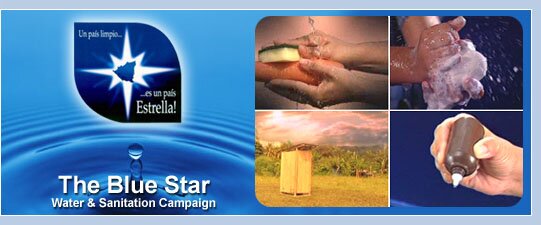 |
 BLUE STAR CAMPAIGN MATERIALS NICARAGUA BLUE STAR CAMPAIGN MATERIALS NICARAGUA
In October 1998 Hurricane Mitch devastated a vast area of Central America , causing a rapid increase in acute diarrheal diseases and respiratory illnesses. In response the Blue Star Water and Sanitation Campaign successfully used mass media, community mobilization, advocacy and educational training to increase the prevalence of appropriate hygiene and water management practices. Many materials were developed for the various creative elements of the campaign. Central pieces included these six television spots:
|

Give your children a clean house,
clean latrine, clean water,
and clean hands.
|

Wash your hands, use soap,
and dry with a clean towel.
|
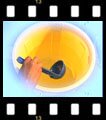
Keep the water clean; keep the
lid on, and always use the ladle.
|
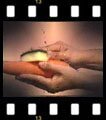
Always wash your hands before cooking and eating, and after going to the latrine and changing diapers.
|
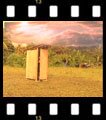
Proper use of a latrine prevents diarrhea.
|
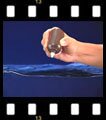
Give your children chlorinated water.
|
EVIDENCE OF IMPACT
Before developing the project activities and materials, an assessment of the communication media and formative research on the knowledge, attitudes and practices around water were undertaken. These identified the intervention focuses. Extensive project evaluation revealed considerable impact. For example, 85% of the people from the urban areas and 87% from the rural areas of the municipalities surveyed in the Mitch area said they had heard or seen water and sanitation messages in the last month. The percentage that remembered specifically having heard or seen messages about the Blue Star campaign was lower although still considerable 43.4% in urban areas and 50% in rural areas.
CREDITS
The Blue Star campaign was implemented by the Johns Hopkins Bloomberg School of Public Health/Center for Communication Programs (CCP) with funding from the U.S. Agency for International Development (USAID). State institutions and non-governmental organizations that participated in the development of activities include Nicaragua's Ministry of Health, Rural Aqueduct Management Office, National Aqueduct and Sewage Company, Ministry of Education, Ministry of Construction and Transportation, the Environmental Health Project, Save the Children-USA, the Nicaraguan Red Cross, the American Red Cross, the Adventist Development and Relief Agency, Action Against Hunger, Plan International, Alistar, Prosalud, and the municipal offices of El Viejo, El Realejo, Posoltega, San Lorenzo, Wiwili, Palacaguina and Corinto.
 See resources for Water and Sanitation Communication See resources for Water and Sanitation Communication
Back to M/MC Home
|



